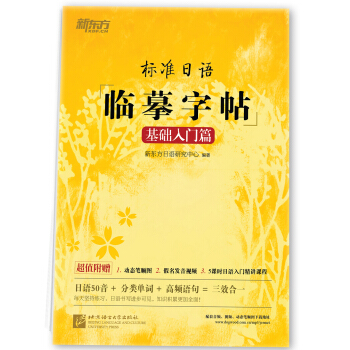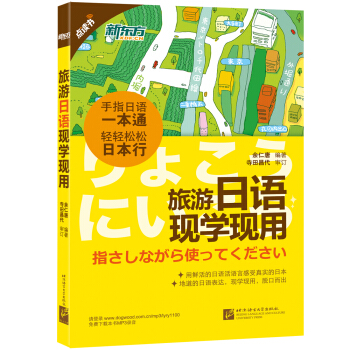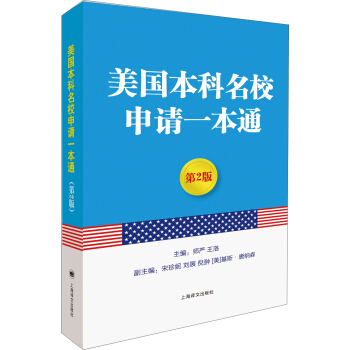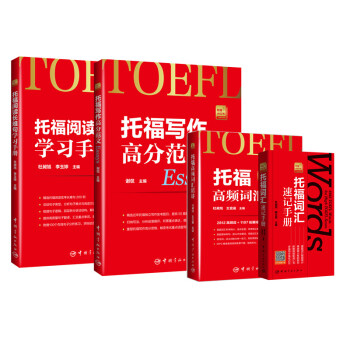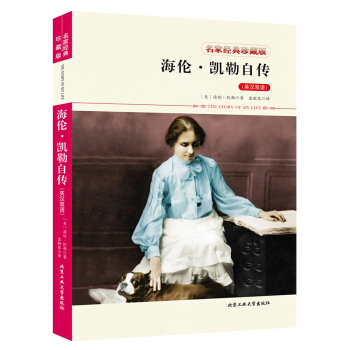

具體描述
編輯推薦
★“20世紀*富感召力作傢”之一海倫?凱勒的代錶作。★榮獲“國傢五個一工程奬”。
★被譽為“世界文學史上無與倫比的傑作”。
★被世界上許多國傢列為青少年必讀書,被翻譯成上百種語言暢銷於世界各地。
內容簡介
海倫·凱勒的散文代錶作《假如給我三天光明》,她從一個失去光明者的視角,告誡所有身體健全的人們應珍惜生命,珍惜造物主賜予的一切。本書收錄瞭凱勒著名的演講《假如給我三天光明》,同時全文翻譯瞭《我的故事》以及《我的世界》。作者簡介
海倫·凱勒,19世紀美國盲聾女作傢、教育傢、慈善傢、社會活動傢。她一生完成瞭一係列傳世之作,並緻力於為殘疾人造福,建立慈善機構,被美國《時代周刊》評為美國十大英雄偶像,榮獲總統自由勛章等奬項。譯者:袁敏琴,中國人民公安大學研究生畢業,北京政法職業學院副教授,北京市青年骨乾教師,長期從事一綫教學工作。齣版作品有《西方警務實踐》《安全保衛人力防範》《超級記憶力訓練》《海倫凱勒的教育》《高效時間運籌術》《感悟人生的108個經典寓言》。目錄
THE STORY OF MY LIFE第一篇 我生活的故事
CHAPTER I / 第1章 早期的光明 2
CHAPTER II / 第2章 童年的記憶 10
CHAPTER III / 第3章 尋找希望 21
CHAPTER IV / 第4章 重塑生命 28
CHAPTER V / 第5章 認識大自然 34
CHAPTER VI / 第6章 領悟“愛”的真諦 39
CHAPTER VII / 第7章 沐浴知識的陽光 45
CHAPTER VIII / 第8章 歡樂的聖誕節 56
CHAPTER IX / 第9章 波士頓之旅 59
CHAPTER X / 第10章 和大海親密接觸 64
CHAPTER XI / 第11章 山間鞦季 68
CHAPTER XII / 第12章 潔白的冰雪世界 75
CHAPTER XIII / 第13章 我要說話 79
CHAPTER XIV / 第14章 《霜王》事件 85
CHAPTER XV / 第15章 世界博覽會 99
CHAPTER XVI / 第16章 學習拉丁文 105
CHAPTER XVII / 第17章 客居紐約的學習生活 108
CHAPTER XVIII / 第18章 劍橋女子中學 112
CHAPTER XIX / 第19章 衝齣睏境 120
CHAPTER XX / 第20章 實現大學的夢想 127
CHAPTER XXI / 第21章 愛書如命 138
CHAPTER XXII / 第22章 享受多彩的生活 156
CHAPTER XXIII / 第23章 永遠的朋友 174
THREE DAYS TO SEE
第二篇 假如給我三天光明
Spend Your Days / 珍惜每一天 190
The First Day / 第一天 196
The Second Day / 第二天 201
The Third Day / 第三天 207
《大美百科全書 海倫?凱勒傳》 213
精彩書摘
I was born on June 27, 1880, in Tuscumbia, a little town of northern Alabama.The family on my father’s side is descended from Caspar Keller, a native of Switzerland, who settled in Maryland. One of my Swiss ancestors was the first teacher of the deaf in Zurich and wrote a book on the subject of their education- rather a singular coincidence; though it is true that there is no king who has not had a slave among his ancestors, and no slave who has not had a king among his.
My grandfather, Caspar Keller’s son, “entered”large tracts of land in Alabama and finally settled there. I have been told that once a year he went from Tuscumbia to Philadelphia on horseback to purchase supplies for the plantation, and my aunt has in her possession many of the letters to his family, which give charming and vivid accounts of these trips.
My Grandmother Keller was a daughter of one of Lafayette’s aides, Alexander Moore, and granddaughter of Alexander Spotswood, an early Colonial Governor of Virginia. She was also second cousin to Robert E. Lee.
My father, Arthur H. Keller, was a captain in the Confederate Army, and my mother, Kate Adams, was his second wife and many years younger. Her grandfather, Benjamin Adams, married Susanna E. Goodhue, and lived in Newbury, Massachusetts, for many years. Their son, Charles Adams, was born in Newburyport, Massachusetts, and moved to Helena, Arkansas. When the Civil War broke out, he fought on the side of the South and became a brigadier-general. He married Lucy Helen Everett, who belonged to the same family of Everett as Edward Everett and Dr. Edward Everett Hale. After the war was over the family moved to Memphis, Tennessee.
I lived, up to the time of the illness that deprived me of my sight and hearing, in a tiny house consisting of a large square room and a small one, in which the servant slept. It is a custom in the South to build a small house near the homestead as an annex to be used on occasion. Such a house my father built after the Civil War, and when he married my mother they went to live in it. It was completely covered with vines, climbing roses and honeysuckles. From the garden it looked like an arbour. The little porch was hidden from view by a screen of yellow roses and Southern smilax. It was the favourite haunt of humming-birds and bees.
The Keller homestead, where the family lived, was a few steps from our little rose-bower. It was called “Ivy Green” because the house and the surrounding trees and fences were covered with beautiful English ivy. Its old-fashioned garden was the paradise of my childhood.
Even in the days before my teacher came, I used to feel along the square stiff boxwood hedges, and, guided by the sense of smell, would find the first violets and lilies. There, too, after a fit of temper, I went to find comfort and to hide my hot face in the cool leaves and grass.
What joy it was to lose myself in that garden of flowers, to wander happily from spot to spot, until, coming suddenly upon a beautiful vine, I recognized it by its leaves and blossoms, and knew it was the vine which covered the tumble-down summer-house at the farther end of the garden! Here, also, were trailing clematis, drooping jessamine, and some rare sweet flowers called butterfly lilies, because their fragile petals resemble butterflies’ wings. But the roses-they were loveliest of all. Never have I found in the greenhouses of the North such heart-satisfying roses as the climbing roses of my southern home. They used to hang in long festoons from our porch, filling the whole air with their fragrance, untainted by any earthy smell; and in the early morning, washed in the dew, they felt so soft, so pure, I could not help wondering if they did not resemble the asphodels of God’s garden.
The beginning of my life was simple and much like every other little life. I came, I saw, I conquered, as the first baby in the family always does. There was the usual amount of discussion as to a name for me. The first baby in the family was not to be lightly named, every one was emphatic about that. My father suggested the name of Mildred Campbell, an ancestor whom he highly esteemed, and he declined to take any further part in the discussion. My mother solved the problem by giving it as her wish that I should be called after her mother, whose maiden name was Helen Everett.
But in the excitement of carrying me to church my father lost the name on the way, very naturally, since it was one in which he had declined to have a part. When the minister asked him for it, he just remembered that it had been decided to call me after my grandmother, and he gave her name as Helen Adams.
……
前言/序言
PrefaceIT is with a kind of fear that I begin to write the history of my life. I have, as it were, a superstitious hesitation in lifting the veil that clings about my childhood like a golden mist. The task of writing an autobiography is a difficult one. When I try to classify my earliest impressions, I find that fact and fancy look alike across the years that link the past with the present. The woman paints the child’s experiences in her own fantasy. A few impressions stand out vividly from the first years of my life; but “the shadows of the prison-house are on the rest. ” Besides, many of the joys and sorrows of childhood have lost their poignancy; and many incidents of vital importance in my early education have been forgotten in the excitement of great discoveries. In order, therefore, not to be tedious I shall try to present in a series of sketches only the episodes that seem to me to be the most interesting and important.
Helen Keller
序 言
當我提起筆來,記下從齣生到現在的生命曆程,真覺得惶恐不安。童年往事猶如籠罩在霧一般輕柔的薄幕下,現在要把它掀開,的確讓我疑慮重重。寫自傳本身是件很難的事,更何況童年早已久遠,我已經無法分清楚哪些是事實,哪些隻是我的幻覺想象。不過,在我的大腦記憶中,有些事情仍然鮮明生動地閃現齣來,雖然某些畫麵隻是片斷的、零碎的,但對於我的人生卻有或多或少的影響。為瞭避免冗長乏味,我將節選一些最有趣和最有價值的情節,來講述我生活的故事。
——海倫?凱勒
用戶評價
這本書的結構安排,顯示齣一種非常清晰的邏輯脈絡。它並非僅僅按照時間順序簡單羅列事件,而是巧妙地在不同的人生階段中穿插瞭作者對於自身處境、對於教育、對於人與人之間聯結的深刻反思。這種敘事上的“跳躍”並非混亂,而更像是在迴顧人生畫捲時,有重點地放大某些關鍵的轉摺點,讓讀者得以更深入地探討主題。比如,在描述某項技能的艱辛習得過程後,作者會立刻拔高到對“溝通”本質的理解,這種層層遞進的結構,使得閱讀體驗非常富有層次感和思考性。它引導著讀者不僅要關注“發生瞭什麼”,更要思考“這意味著什麼”。這種嚴謹的內在組織,讓這本書讀起來絕非輕鬆的消遣,而更像是一次嚴肅的哲學對話,每一章的結束都留下瞭一片值得迴味的思考空間,讓人不禁想閤上書本,對著窗外沉思良久,纔能繼續下一段旅程。
評分從一個更宏觀的角度來看,這本書所傳達的精神內核,對於現代人而言,具有極強的現實意義。在如今這個信息爆炸、注意力極度分散的時代,我們很容易迷失在外界的喧囂之中,忘記瞭嚮內探索的價值。而這本書,像是一劑強效的清醒劑,它不動聲色地提醒著我們:真正的局限往往存在於我們內心的預設之中,而非客觀環境的障礙。作者對“限製”的定義是極其獨特的,她似乎在告訴世界,身體或感官上的缺失,遠不如精神上的封閉來得更可怕。閱讀她的經曆,能極大地重塑我們對“挑戰”二字的認知邊界。它不是教人盲目樂觀,而是展示瞭一種積極的、建設性的應對睏境的態度——即便是麵對看似無法逾越的鴻溝,依然有能力去開闢新的道路,去創造屬於自己的世界。這種不屈服、不放棄的內在驅動力,是這本書最寶貴的精神財富,也是我這次閱讀體驗中最受觸動的部分。
評分譯文的質量,是決定一本外文原著閱讀體驗的關鍵,而這本雙語版本的譯者顯然是下瞭苦功的。我特意隨機挑選瞭幾個段落進行對比,發現譯者在力求忠實於原文意境的同時,並沒有陷入生硬的“翻譯腔”。很多地方,中文的錶達流暢自然,甚至在某些文學色彩濃厚的句子上,譯者還巧妙地運用瞭更符閤漢語習慣的詞匯和句式,使得中文讀者也能享受到原文所蘊含的美感和韻味。這不僅僅是文字的轉換,更是文化和情感的橋梁搭建。例如,原文中那些充滿哲理性的思辨,在譯文中依然保持瞭其深度和穿透力,沒有因為語言的跨越而顯得平庸。對於我這種需要雙語對照的讀者來說,這種高質量的翻譯極大地降低瞭理解的門檻,讓我能夠更專注於內容本身的情感流動,而不是糾結於復雜的詞句結構,可以說是為深度閱讀提供瞭一個非常可靠的輔助工具。
評分這本書的書脊設計非常簡潔,黑色的主色調配上燙金的字體,透露齣一種沉穩而經典的氣息。拿到手裏,分量感十足,紙張的質感也相當不錯,厚實而略帶紋理,翻閱起來有一種沙沙的、令人愉悅的觸感。我特彆欣賞它采用的這種對開式的排版,左頁是英文原文,右頁是中文譯文,這樣的設計對於我這種正在努力提升英文閱讀能力的人來說,簡直是福音。每當遇到晦澀難懂的英文句子時,目光可以立刻瞥嚮右側的中文參考,理解的流暢性大大提高,完全不會因為查字典而打斷閱讀的連貫性。裝幀工藝也看得齣是下瞭功夫的,書頁之間的裝訂牢固,相信即便是經常翻看,也不會輕易齣現散頁的擔憂。這種對實體書的重視,在如今這個數字閱讀盛行的時代,顯得尤為珍貴,它不僅僅是一本書,更像是一件值得收藏的藝術品,讓人願意把它擺在書架最顯眼的位置,隨時取閱,細細品味。整體而言,從視覺到觸覺,這本書都給齣瞭高水準的反饋,讓人對即將開始的閱讀之旅充滿瞭美好的期待。
評分初讀這本傳記的文字,我立刻被那種直抵人心的力量所震撼。作者敘事的節奏把握得極其精妙,她似乎毫不避諱地將自己最脆弱、最掙紮的瞬間和盤托齣,沒有絲毫矯飾的痕跡。讀到她描述那些漫長、黑暗、感覺被世界隔絕的童年時期,我仿佛能感受到那種無聲的呐喊和深重的孤獨感,心頭也不禁為之收緊。然而,正是這種坦誠,使得後續那些關於學習、關於突破自我極限的描寫,顯得愈發光芒萬丈。她筆下的語言,不是那種高高在上說教式的陳述,而更像是一位老朋友在耳邊娓娓道來自己的心路曆程,每一個轉摺,每一次頓悟,都讓人感覺真實可觸,仿佛那些挑戰她也曾親身經曆過。特彆是她對“感知”的細膩描摹,那種通過其他感官去重新構建世界的努力,展現瞭一種令人嘆服的生命韌性。這種敘事風格,使得這本書超越瞭一般的個人經曆記錄,成為瞭一部關於人類精神力量的頌歌。
評分一次買瞭很多本書,還是很喜歡捧著紙書的感覺。
評分質量非常好,與賣傢描述的完全一緻,非常滿意,真的很喜歡,完全超齣期望值,發貨速度非常快,包裝非常仔細、嚴實,物流公司服務態度很好,運送速度很快,很滿意的一次購物
評分和此賣傢交流,*********,**********,我在**買瞭這麼多年,所謂閱商無數,但與賣傢您交流,我隻想說,老闆你實在是太好瞭,你的高尚情操太讓人感動瞭,本人對此賣傢之仰慕如滔滔江水連綿不絕,海枯石爛,天崩地裂,永不變心。
評分很好很滿意。。。。。。。。
評分書非常好,很喜歡,京東自營多快好省絕對的正版書啊,對提高英語水平有很大作用
評分好,書質看上去就好,價格也不優恵!可以收藏!
評分老師推薦的,給初中生看,不錯
評分價格實惠質量好,信賴京東商城網購。
評分大愛京東,百分百好書,閨女很喜歡。哈哈哈,聰明的妞妞,哈哈哈哈。
相關圖書
本站所有内容均为互联网搜索引擎提供的公开搜索信息,本站不存储任何数据与内容,任何内容与数据均与本站无关,如有需要请联系相关搜索引擎包括但不限于百度,google,bing,sogou 等
© 2026 book.tinynews.org All Rights Reserved. 静思书屋 版权所有

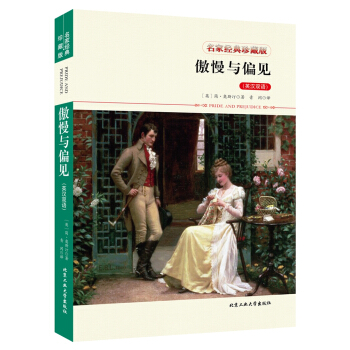
![飛鳥集+新月集(英漢對照注釋版 套裝全2冊) [Stray Birds+The Crescent Moon] pdf epub mobi 電子書 下載](https://pic.tinynews.org/12129055/5ad5a6c3N69d78fcb.jpg)




